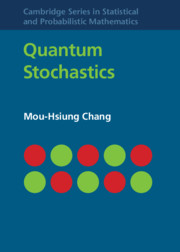Book contents
- Frontmatter
- Dedication
- Contents
- Preface
- Introduction and Summary
- 1 Operator Algebras and Topologies
- 2 Quantum Probability
- 3 Quantum Stochastic Calculus
- 4 Quantum Stochastic Differential Equations
- 5 Quantum Markov Semigroups
- 6 Minimal QDS
- 7 Quantum Markov Processes
- 8 Strong Quantum Markov Processes
- 9 Invariant Normal States
- 10 Recurrence and Transience
- 11 Ergodic Theory
- Bibliography
- Index
Introduction and Summary
Published online by Cambridge University Press: 05 February 2015
- Frontmatter
- Dedication
- Contents
- Preface
- Introduction and Summary
- 1 Operator Algebras and Topologies
- 2 Quantum Probability
- 3 Quantum Stochastic Calculus
- 4 Quantum Stochastic Differential Equations
- 5 Quantum Markov Semigroups
- 6 Minimal QDS
- 7 Quantum Markov Processes
- 8 Strong Quantum Markov Processes
- 9 Invariant Normal States
- 10 Recurrence and Transience
- 11 Ergodic Theory
- Bibliography
- Index
Summary
It is widely known that the commutative probability theory based on Kolmogorov's measure theoretic axioms and the quantum probability theory based on von Neumann's postulates were both created at about the same time in the 1930s (see, e.g., Kolmogorov [Kol50] and von Neumann [vNeu55] for the origins of these 2 very different but parallel lines of theory). Following Kolmogorov's original work, theory of the classical Markov processes has been the subject of intensive research for the last few decades. The classical theory, its applications, and their connections to other areas of research have been systematically developed by many prominent probabilists as illuminated by their widely referenced monographs such as those of Dynkin [Dyn62], Blumenthal and Getoor [BG68], Ethier and Kurtz [EK85], Renuv and Yor [RY99], and others. On the other hand, development of a complete theory of quantum stochastics such as quantum Markov processes has been progressing at a much slower pace in comparison with that of its classical counterpart. This is perhaps because development of a theory of quantum stochastics and quantum Markov processes requires an unusually large number of tools from operator theory and perhaps also because the probabilistic and analytical tools for understanding sample path behaviors of quantum stochastic processes have yet to be developed.
The main goal of this monograph is to give a systematic exploration of relevant topics in quantum Markov processes in hopes of stimulating further research along this line and of stimulating interest in the classical stochastics community for research in its quantum counterpart. This monograph is written largely based on the current account of relevant research results by widely surveying relevant results contributed by many prominent researchers in quantum probability, quantum noise, quantum stochastic calculus, stochastic quantum differential equations, quantum Markov semigroups, strong quantum Markov processes, and large time asymptotic behaviors of quantum Markov semigroups through a systematic and self-contained introduction/presentation of these very interesting topics in an attempt to illuminate the rigor and beauty of quantum stochastics and quantum Markov processes.
- Type
- Chapter
- Information
- Quantum Stochastics , pp. 1 - 7Publisher: Cambridge University PressPrint publication year: 2015

